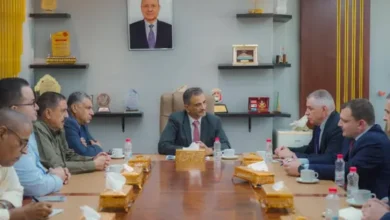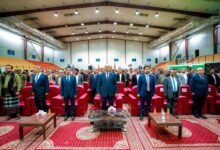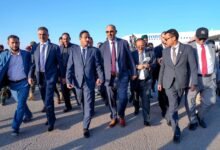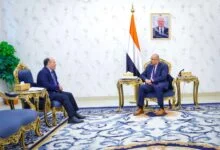internationalSouth Arabia
Great Success of the Seminar Held by the Independent Southern Group in UN Human Rights Council
[su_label type=”info”]SMA News – Geneva – Exclusive [/su_label][su_spacer size=”10″] On Monday September 17th, 2018, the Independent Southern Group held a seminar about human rights in southern Yemen in the UN Human Rights Council – Geneva. The seminar witnessed surprising attendance of human rights organizations and other foreign delegations. The seminar discussed three papers: Report of UN Experts Taskforce on UN Human Rights Council, Violations of Human Rights in Southern Yemen committed by Al-Houthi Militias and Justifications of Self-Determination for the Southern People.
The first paper discussed Report of UN Experts Taskforce on UN Human Rights Council and presented by Mr. Zaky Othman. The paper analyzed the report the report issued in August 28th, 2018. The paper discussed positive points of the report in addition to gaps including not covering violations of Al-Houthi-Saleh militias in Aden, Lahj and Abian in 2015 although governmental authority in Aden cooperated through facilitating transportation in addition to cooperation of NGOs in the south who provided observation reports. Mr. Othman indicated that Al-Houthis in Sanaa didn’t cooperate well especially in visiting prisons. He added that the report didn’t identify the liability of commanders about violations committed by their troops in Taiz as this leaves the door open to more investigations in the future in spit of human rights reports issued by international organizations concerning this issue. The paper concluded that the report didn’t fulfill the expectations of victims in the south and recommended that the UN Human Rights council should consider these remarks to guarantee the neutrality of international investigation bodies. The paper also suggested to reform the national commission of Human Rights according to Paris principles in addition to forming a national commission for transitional justice.
The second paper discussed Violations of Human Rights in Southern Yemen committed by Al-Houthi Militias during 2015 war. Mr. Anis Al-Shurik presented a report about massacres committed in Aden and other southern governorates including Dar Saad and Al-Tawahi. In addition, the report presented severe violations including killing civilians and destroying infrastructure that should be considered as crimes against humanity. He demanded UN Human Rights Council to exercise pressure over Al-Houthis to release Mahmoud Al-Subaihi, former minister of Defense, and his companions as Al-Houthis deny them the right to communicate with their families in addition to using illegal methods inside prisons and detainment camps. He also asserted the importance of charging war criminal and militias leaders in front of International Court of Justice. He demanded that UN Human Rights Council, UN and international bodies to charge those criminals as their crimes should never pass without punishment.
The third paper, presented by judge Mohamed Al-Sahemi, discussed Justifications of Self-Determination for the Southern People and history of the southern cause since the union between north and south in 1990, northern invasion and occupation of Aden in 1994, public denunciation of the invasion and start of the southern movement in 2007 and finally the second invasion of the south by Al-Houthi – Saleh militias in 2015. The second invasion found fierce resistance that eventually led to liberating most southern governorates with backup of Arab Coalition. Al-Sahemi also referred to poor conditions of services and miserable humanitarian conditions in the south in addition to the government’s failure to provide southern citizens with simplest needs of life. He demanded international organizations to support the southern people in the right of self-determination.
The group also participated in a seminar about self-determination held by the UN Human Rights Council at the same day. Mr. Nasr Mohamed Al-Esaie presented the southern paper that included a presentation of the southern cause along its all phases and humanitarian, legal and political violations against the southern people that ended with intentional negligence of basic services exercises by the legitimacy government in southern cities and governmental failure to provide southern citizens with their basic needs. This led the southern people to demonstrate against this intentional violation of their rights and the forming a unified political body to represent them and this happened by forming the southern transitional council.
Al-Esaie asserted the right of southern people in self-determination and establishing an independent state according to the international law. This may happen in two ways:
First: one-sided disengagement with Arab Republic of Yemen and declaring independence as the northern part of the Union agreement between the south and north didn’t commit with its terms. This what happened before When Arab Republic of Syria disengaged from Arab Republic of Egypt after the union agreement signed between them to form the United Arab Republic (1958 – 1961) as in September 28th, 1961, Syria declared disengagement and Egypt accepted that.
Second: a referendum of self-determination for all southern citizens to determine either to stay in the federal state with the north or disengagement and go to the two-states solution under direct supervision of the United Nations.
Al-Esaie said: “All holy legislations and human laws, including UN convention signed by all countries including Arab Republic of Yemen (the north) and Peoples’ Democratic Republic of Yemen (the south), are clear evidence on the right of the southern people in self-determination”. Therefore, he demanded UN and all free men in the world to support the right of the southern people in self-determination and establishing a modern independent state.
The first paper discussed Report of UN Experts Taskforce on UN Human Rights Council and presented by Mr. Zaky Othman. The paper analyzed the report the report issued in August 28th, 2018. The paper discussed positive points of the report in addition to gaps including not covering violations of Al-Houthi-Saleh militias in Aden, Lahj and Abian in 2015 although governmental authority in Aden cooperated through facilitating transportation in addition to cooperation of NGOs in the south who provided observation reports. Mr. Othman indicated that Al-Houthis in Sanaa didn’t cooperate well especially in visiting prisons. He added that the report didn’t identify the liability of commanders about violations committed by their troops in Taiz as this leaves the door open to more investigations in the future in spit of human rights reports issued by international organizations concerning this issue. The paper concluded that the report didn’t fulfill the expectations of victims in the south and recommended that the UN Human Rights council should consider these remarks to guarantee the neutrality of international investigation bodies. The paper also suggested to reform the national commission of Human Rights according to Paris principles in addition to forming a national commission for transitional justice.
The second paper discussed Violations of Human Rights in Southern Yemen committed by Al-Houthi Militias during 2015 war. Mr. Anis Al-Shurik presented a report about massacres committed in Aden and other southern governorates including Dar Saad and Al-Tawahi. In addition, the report presented severe violations including killing civilians and destroying infrastructure that should be considered as crimes against humanity. He demanded UN Human Rights Council to exercise pressure over Al-Houthis to release Mahmoud Al-Subaihi, former minister of Defense, and his companions as Al-Houthis deny them the right to communicate with their families in addition to using illegal methods inside prisons and detainment camps. He also asserted the importance of charging war criminal and militias leaders in front of International Court of Justice. He demanded that UN Human Rights Council, UN and international bodies to charge those criminals as their crimes should never pass without punishment.
The third paper, presented by judge Mohamed Al-Sahemi, discussed Justifications of Self-Determination for the Southern People and history of the southern cause since the union between north and south in 1990, northern invasion and occupation of Aden in 1994, public denunciation of the invasion and start of the southern movement in 2007 and finally the second invasion of the south by Al-Houthi – Saleh militias in 2015. The second invasion found fierce resistance that eventually led to liberating most southern governorates with backup of Arab Coalition. Al-Sahemi also referred to poor conditions of services and miserable humanitarian conditions in the south in addition to the government’s failure to provide southern citizens with simplest needs of life. He demanded international organizations to support the southern people in the right of self-determination.
The group also participated in a seminar about self-determination held by the UN Human Rights Council at the same day. Mr. Nasr Mohamed Al-Esaie presented the southern paper that included a presentation of the southern cause along its all phases and humanitarian, legal and political violations against the southern people that ended with intentional negligence of basic services exercises by the legitimacy government in southern cities and governmental failure to provide southern citizens with their basic needs. This led the southern people to demonstrate against this intentional violation of their rights and the forming a unified political body to represent them and this happened by forming the southern transitional council.
Al-Esaie asserted the right of southern people in self-determination and establishing an independent state according to the international law. This may happen in two ways:
First: one-sided disengagement with Arab Republic of Yemen and declaring independence as the northern part of the Union agreement between the south and north didn’t commit with its terms. This what happened before When Arab Republic of Syria disengaged from Arab Republic of Egypt after the union agreement signed between them to form the United Arab Republic (1958 – 1961) as in September 28th, 1961, Syria declared disengagement and Egypt accepted that.
Second: a referendum of self-determination for all southern citizens to determine either to stay in the federal state with the north or disengagement and go to the two-states solution under direct supervision of the United Nations.
Al-Esaie said: “All holy legislations and human laws, including UN convention signed by all countries including Arab Republic of Yemen (the north) and Peoples’ Democratic Republic of Yemen (the south), are clear evidence on the right of the southern people in self-determination”. Therefore, he demanded UN and all free men in the world to support the right of the southern people in self-determination and establishing a modern independent state.






